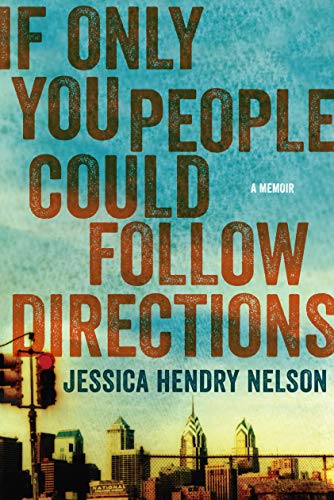If Only You People Could Follow Directions by Jessica Hendry Nelson
It would be easy to call If Only You People Could Follow Directions (Counterpoint Press, 2014) another memoir about addiction. And in a way, it is – author Jessica Hendry Nelson unflinchingly chronicles what it’s like to grow up and come of age in a home torn apart by alcohol and drugs. But her linked, abstract essays and her dense prose elevate this complicated story, creating something that doesn’t fit into any neat category. Instead of the traditional, straight-forward memoir that we’ve come to expect from the genre, Hendry Nelson offers us something new, something exciting, and something you won’t be able to put down.
Don’t believe me? With starred reviews from both Kirkus and the Library Journal, and touted by the Boston Globe as “brilliant and facile in her use of language,” Hendry Nelson’s memoir is blowing up the book world. Even Oprah loves it – she recently named it one of her “Memoirs Too Powerful to Put Down.” BookTrib got a chance to chat with Hendry Nelson about her memoir, her writing process, and what it means to write such an honest and powerful story.
BOOKTRIB: At what point did you know this was a story you needed to tell? Was there a particular moment or experience that persuaded you to write the memoir?
Jessica Hendry Nelson: I don’t know that this was a story I needed to tell so much as it is a story that deserves the telling. These characters warranted exploration and I hoped a reader might indentify something familiar. Having said that, it sounds like I had small ambitions, but I think these are big, meaty ambitions actually. I want to try to nail down the difference between a story that needs to be told and a story that could be told, because I think there’s this temptation with memoir, especially memoir that deals with especially rife subject matter, to assume the writer has either a confessional prerogative or a political one (or both—usually both.). And while some memoirists do have these impulses (and these are fine impulses to have), I agree with David Shields that the most compelling work “occupies a liminal space between genres.” This plot, this story, was something of a pre-manufactured cloth through which I could turn my attention to other, more interesting matters. (More interesting to me, that is.) The books that matter most to me are genre-busting, genre-bending; this book feels like the first step down a steep and dangerous rabbit-hole. Every book must find its own form, and this book certainly found its own form, too, but that form was more interested in what collage can accomplish than it was with telling any particular (read: familiar) narrative about addiction. I wanted to get at the idiosyncratic, beautiful, and devastating core of these characters. The addiction storyline just happened to be our circumstances. I would have written this story even if they were straight from a Leave It to Beaver episode. You don’t need a dramatically fraught narrative to write memoir, you just need to have an interest in character. We’re all compelling, contradictory, psychologically dense creatures.
BT: Your memoir deals with a lot of intense subjects―addiction, sex, drug use―mostly in regards to your own family. Did you ever find it difficult to explore these themes while writing about people so close to you?
JHN: In short, no. There are several reasons why. First, my family doesn’t just leave the proverbial closet unlocked, we take the skeletons to the hoedown and introduce them to the band. Addiction isn’t a quiet disease. It’s hard to hide when the car is smashed weekly and you’re on a first-name basis with the ER nurses and the local cops. Secondly, it’s part of the AA tradition. For those who haven’t had the pleasure of attending an AA or Alanon (or NA or Narnon) meeting, it’s a circle of people sharing stories. There’s laughing and there’s crying and sometimes everyone’s yawning and chain-smoking, but storytelling is the central activity around which the whole program functions. Thirdly, I knew I was writing from a place of love, even when I revealed something personal, and so I had faith that this would come through. Mostly, though, I’m just not emoting when I write. I’m thinking, problem-solving, jumping in and out of my chair, chewing a pen cap to shit, but I’m not dwelling. No time.
BT: Typical memoirs follow a linear path, telling one story from beginning to end. But yours jumps in time, with essays about childhood often following those on adolescence or college. What made you decide to follow such a non-traditional structure?
JHN: I realized early in the writing that the truth of this story couldn’t be found in a chronological structure. Chronology presumes that life fits neatly into the traditional narrative arc, but it doesn’t. Juxtaposition is a critical tool in locating what matters. Memory, too, doesn’t follow a linear line and our life stories don’t fit neatly onto the peg board of this-happened-then-that. Chronology is a story we tell ourselves, and so it makes sense that this is the way we most often tell our stories to others, but it also makes neat connections that glance over the messy truth.
BT: Do you have any advice for aspiring writers, particularly aspiring memoirists?
JHN: I’m hesitant to offer advice to anyone because it assumes my obsessions, aesthetic and otherwise, gel with theirs. I think we each have to locate what moves us and gnaw that bone to the marrow. I have to remind myself that it’s OK to gnaw the same bone forever, so long as the approach stays new. Understand the context of the established boundaries and push against them with everything you have.
BT: What comes next for you? Are you working on any new projects?
JHN: I’m working on a collection of essays that explore theme(s) of wonder. Unfortunately, I can’t be more specific than that right now. I’m still figuring it out for myself. I’m having a ‘wonder party’ and it’s so much fun.
Winners for giveaway will be selected 06/27/14 at 12:00pm ET
Buy this Book!
Amazon





